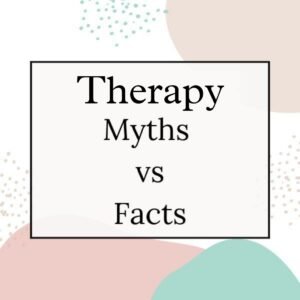
Introduction
Therapy often carries a cloud of misconceptions that deter people from seeking help. Despite the growing awareness of mental health, myths about counseling persist, creating unnecessary barriers for those in need. Let’s unpack some of the most common myths about therapy and separate fact from fiction to help you make informed decisions about your mental health journey.
Myth 1: Therapy is only for “Serious” mental health issues
Fact: Therapy is for everyone. You don’t need to have a diagnosed mental health condition to benefit from counseling. Many people seek therapy to cope with everyday stress, improve relationships, or gain clarity on personal goals. Therapy can be a proactive approach to maintaining mental well-being, not just a reactive measure for crises.
Myth 2: Going to therapy means you’re weak
Fact: Seeking therapy is a sign of strength. Acknowledging that you need help and taking steps to address your challenges is a courageous act. Therapy requires vulnerability, self-reflection, and effort—qualities that reflect resilience and determination, not weakness.
Myth 3: Therapists just listen and nod
Fact: Therapy is an active, collaborative process. Therapists are trained professionals who use evidence-based techniques to help clients work through their challenges. While listening is a key component, therapists also provide tools, strategies, and insights to empower clients to make meaningful changes in their lives.
Myth 4: You have to talk about your past
Fact: Therapy focuses on what you need. While exploring past experiences can be helpful, it’s not always necessary. Many therapy approaches, like Cognitive Behavioral Therapy (CBT), are future-focused and emphasize practical strategies for managing current challenges. Your therapist will tailor sessions to your goals and comfort level.
Myth 5: Therapy takes forever
Fact: The duration of therapy varies. Some people achieve their goals in just a few sessions, while others benefit from ongoing support. Short-term therapies, such as Solution-Focused Brief Therapy, are designed to address specific issues quickly. The length of therapy depends on your unique needs and objectives.
Myth 6: Therapy is only for adults
Fact: Therapy is beneficial for all age groups. Children, teenagers, and seniors can all benefit from counseling tailored to their developmental stage and unique challenges. Play therapy for kids, family counseling, and specialized support for older adults are just a few examples of how therapy adapts to different age groups.
Myth 7: You have to be in crisis to start therapy
Fact: Therapy is valuable even when things are going well. Therapy isn’t just for managing crises; it’s also a space for personal growth and self-discovery. Many people use therapy to build resilience, enhance self-awareness, and navigate transitions like starting a new job or entering a new phase of life.
Myth 8: Online therapy isn’t as effective as in-person sessions
Fact: Online therapy can be just as effective. Research shows that online counseling is comparable in effectiveness to in-person sessions for many issues, including anxiety, depression, and relationship challenges. Virtual therapy offers convenience, accessibility, and privacy, making it a great option for people with busy schedules or limited access to local therapists.
Myth 9: You have to stick with the first therapist you meet
Fact: Finding the right therapist is a process. Not every therapist will be the right fit for you, and that’s okay. Building a strong therapeutic relationship is key to success in therapy. If the first therapist isn’t a match, don’t hesitate to try someone else until you find a connection that feels comfortable and supportive.
Conclusion
Therapy is a powerful tool for improving mental health, but misconceptions often discourage people from taking the first step. By debunking these myths, we hope to encourage more individuals to explore counseling as a resource for growth, healing, and self-improvement. Remember, therapy is not about fitting into a stereotype—it’s about finding what works best for you. If you’ve been considering therapy, let this be the sign to take that step toward a better you.
#MentalHealthMatters #EndTheStigma #TherapyIsCool #MentalHealthAwareness #ItsOkayToNotBeOkay #TruthAboutTherapy #TherapyWorks #CounselingAwareness #BreakTheStigma #OnlineTherapy #TruthAboutTherapy #TherapyWorks #CounselingAwareness #BreakTheStigma #OnlineTherapy #LetsTalkAboutIt #MindMatters #NormalizeTherapy #YourMentalHealthJourney
LETS NORMALISED THERAPY !!!
READ MORE : Understanding and Addressing Workplace Anxiety


